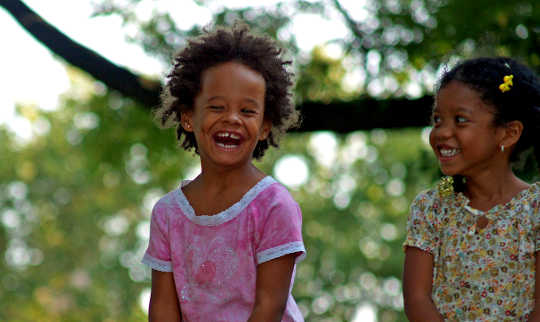
Photo Credits: David Shankbone, Laughter. (cc 3.0)
Just like adults, children use humour in their everyday lives. Some like to make fun of themselves whereas others like to laugh at the expense of others. But what effect does a child’s humour have, for example, on their relationships with others and how they feel about themselves? To find out, we studied the use of humour in children aged between 11 and 16, and discovered a link between a child’s humour style and their mental health.
Our study is based on previous research into styles of humour among adults. Rod Martin and colleagues used a questionnaire to identify four different types of humour: self-enhancing, affiliative, self-defeating, and aggressive. They found evidence to suggest that someone’s styles of humour can have positive or negative impact on their relationships with others and their psychological well-being.
Self-enhancing humour is used to enhance oneself, to boost one’s own sense of self, but is not detrimental to others. For example, someone who is feeling a bit upset about a situation can try to think of something funny about the situation so they feel better about it. Affiliative humour enhances relationships with others and reduces interpersonal tensions. For example, laughing and joking around with one’s friends. These two forms of humour are known as “adaptive” humour styles.
Self-defeating humour is often used to enhance relationships with others at the expense of oneself, whereas aggressive humour can be used to make yourself feel better at the expense of others – such as making fun of another person. These two forms are known as “maladaptive” because of evidence which suggests they are potentially damaging to an individual. It has been suggested that continual use of aggressive humour can alienate others, eventually having a detrimental effect on the user. Self-defeating humour can harm an individual’s mental health, since it involves putting yourself down and repressing one’s own emotional needs to appease others.
It’s useful to distinguish between these forms as they have been linked to aspects of psychological and social adjustment. In many different studies, adults who use adaptive styles of humour are typically found to have better mental health and higher self-esteem, while those using maladaptive humour styles tend to have high levels of anxiety and depression and lower self-esteem. Use of aggressive humour also tends to be associated with social maladjustment – those who use it are more likely to experience problems in their interpersonal relationships.
Humour in children
From reading about the humour-styles approach we wanted to apply the model to children and young people by asking children to complete a series of questionnaires at the beginning and end of the school year. We found the links between humour styles and adjustment that have been found in adults also apply to children.
Our study, published in Europe’s Journal of Psychology, found that those using self-defeating humour at the beginning of the school year were more likely to experience an increase in loneliness and symptoms of depression at the end of the year, along with a decrease in self-esteem. This can also lead to a vicious circle of depressive symptoms, causing a further increase in the use of self-defeating humour and so forth.
However, we also found that those using self-defeating humour do not necessarily fare badly. Few people use only one style, but rather a combination of different styles. So we decided to take a broader approach to our analysis, categorising the children as either “interpersonal humourists”, which includes those who scored above average on aggressive and affiliative humour, but below average on the other two humour styles. “Self-defeaters”, who scored high on this style of humour, but low on all three others. The “humour endorsers” scored above average on all four humour styles. And finally, “adaptive humourists” scored high on the two adaptive styles of humour, but low on aggressive and self-defeating humour.
The self-defeaters scored highest on social adjustment in comparison to the humour endorsers, who appeared to use self-defeating humour to an even greater extent than the self-defeaters themselves. This suggests that the negative effects of using self-defeating humour could be reduced if used alongside other more positive styles.
What this means is that we should try to encourage greater use of the more positive self-enhancing and affiliative types of humour, since they appear to benefit mental health and self-esteem. Self-defeating humour, despite seeming to make others feel better in the short term, can lead to psychological and social adjustment problems, and so should be discouraged, or perhaps used in combination with more positive styles of humour.
So how can this be achieved? My recent work with Lucy James involves an innovative educational intervention to explain the different styles of humour and their impact to school children. This is not so much about teaching children to be “funny”: it’s about educating them about the potential positive and negative effects of the ways in which humour can be used, which will hopefully improve their relationships with others and how they feel about themselves.
![]()
About the Author
Claire Fox, Senior Lecturer in Psychology, Keele University
This article was originally published on The Conversation. Read the original article.
Related Books
at InnerSelf Market and Amazon
























